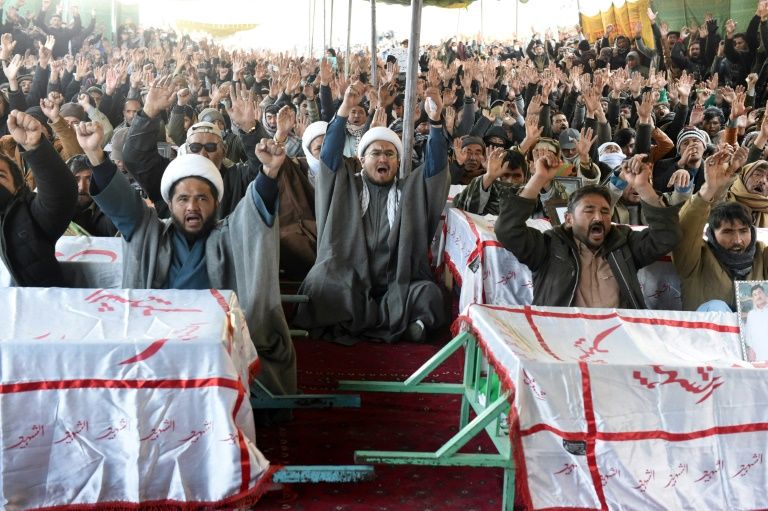Pakistan PM accuses Shiite protesters of ‘blackmail’
Mourners from the Shiite Hazara community protest next to the coffins of miners, who were killed in an attack by the Islamic State group. ©AFP Banaras KHAN
Islamabad (AFP) – Pakistan’s Prime Minister Imran Khan on Friday accused Hazara Shiite protesters of blackmailing him, as they refused for a sixth day to bury the bodies of miners killed in a brutal attack claimed by the Islamic State group.
The 10 miners from the minority community were kidnapped near a remote coal mine in the southern province of Balochistan on Sunday by IS, a Sunni extremist group.
Shiite protesters, numbering up to 3,000, have since blocked a road on the outskirts of Quetta, capital of the oil- and gas-rich province, demanding better protection as well as a visit from Khan.
“No country’s prime minister should be blackmailed like this, otherwise everyone will start blackmailing the prime minister,” Khan said in Islamabad.
He said he would only visit Quetta once the funerals had taken place.
The community’s refusal to bury the bodies is symbolic in Muslim-majority Pakistan, where according to Islamic culture people should be buried within 24 hours, before the next sunset.
Ethnic Hazaras make up most of the Shiite population in Quetta, the capital of Balochistan — the country’s largest and poorest region, rife with ethnic, sectarian and separatist insurgencies.
Hundreds have been killed over the past decade in attacks by Sunni militants, who consider them heretics. The Central Asian features of Hazaras have made them easy targets.
Several solidarity protests have taken place across Pakistan this week and Pakistani Nobel Prize laureate Malala Yousafzai has offered her support.
“I am short of words to express my grief over the brutal killings of Hazara miners. This is not the first time that this has happened. But I hope it is the last,” she tweeted.
“I request that PM @ImranKhanPTI meet with the victims’ families as soon as possible.”
IS is affiliated with the local militant group Lashkar-e-Jhangvi, which previously had links to Pakistan’s Taliban.
Pakistani officials have long denied the presence of IS in the country, but the group has claimed responsibility for several attacks, including a bombing at a vegetable market in 2019.
Disclaimer: Validity of the above story is for 7 Days from original date of publishing. Source: AFP.


